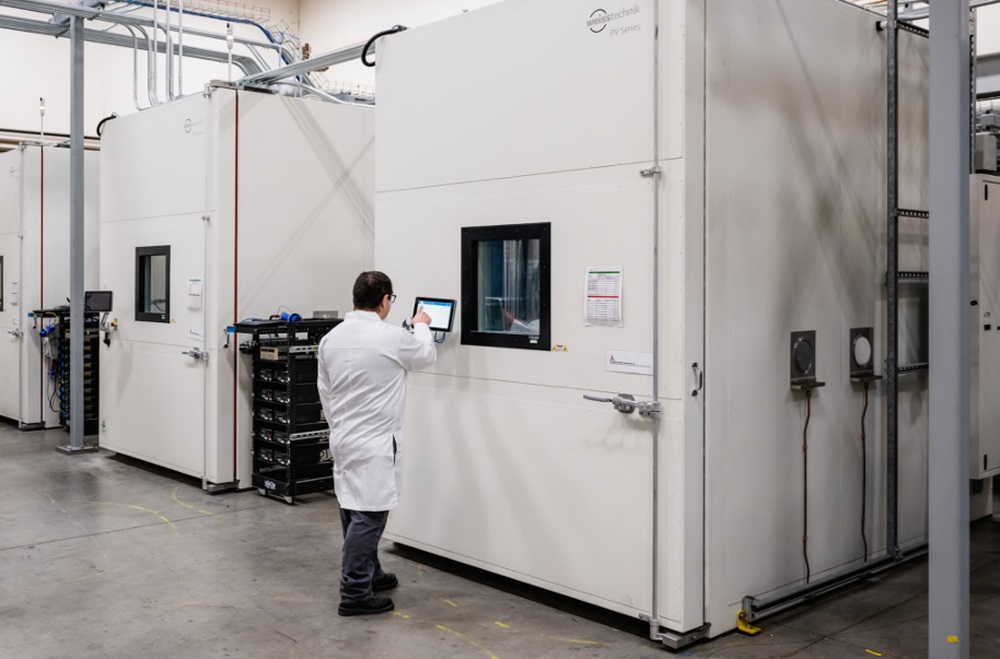PV Evolution Labs (PVEL), an independent test lab for the downstream solar industry and member of the Kiwa Group, published its 2024 PV Module Reliability Scorecard. This 10th edition of the Scorecard names 388 model types of PV modules from 53 manufacturers as Top Performers in PVEL’s testing, the most in the company’s history. Last year the Scorecard named 250 model types among 35 manufacturers.
Kiwa PVEL uses the Product Qualification Program (PQP) to provide the solar industry with empirical data for PV module benchmarking and project-level energy yield and financial modules to identify top-performing PV modules.
The PQP was expanded in the fall of 2023 with a new test to address concerns around ultraviolet-induced degradation (UVID). It also refocused the hail stress sequence (HSS) on identifying the threshold of glass breakage and modified the mechanical stress sequence (MSS) to target module mechanical durability concerns.
In addition to expanded PQP testing, other updates to the Scorecard include a new Top Performer category for hail, highlighting modules that did not experience glass breakage with ≥40 mm hail, and a higher bar for LID+LETID and PAN Top Performers, with a raised threshold for Top Performer qualification as technologies have improved,
This year’s Scorecard emphasizes manufacturers who are Top Performers in multiple categories, providing key takeaways on the impacts of various cell technologies and module designs, and offering a deep dive—for the first time– into Kiwa PVEL’s Incidence Angle Modifier (IAM) test results.
“Our 2024 Scorecard showcases strong results across a diverse group of solar module manufacturers, which reflects the excellence and growth we have observed in PV manufacturing in recent years,” said Kevin Gibson, managing director of Kiwa PVEL. “For over a decade, we’ve tested assumptions about solar module reliability and performance while continuing to refine our methodology as the industry continues to innovate with new technologies and module designs. We’re proud that we’re still setting a high bar for manufacturers and providing downstream buyers with the crucial information they need to make educated procurement decisions.”

This partial list shows for which tests each manufacturer achieved Top Performer status with one or more models. Kiwa PVEL noted that in some cases, test results for some test categories were not available at the time of Scorecard publication. Manufacturers are listed by the number of tests, followed by the number of years they have been designated a Top Performer, in alphabetical order. Click here to find model numbers. The full list of Top Performers is a searchable database, where results can be filtered by PQP test, manufacturer name, module type, cell technology, and more.
“With over 50,000 unique visitors to the 2023 edition, our Scorecard is the industry’s go-to resources for module reliability insights. While we applaud the advances in manufacturing and the number of Top Performers listed, we remind buyers to remain vigilant,” said Tristan Erion-Lorico, vice president of sales and marketing at Kiwa PVEL. “We encourage them to explore each page of the Scorecard to better understand the range of test results that we’re seeing every day at Kiwa PVEL’s labs.”
Notable in this year’s test results is that 66% of module manufacturers experience at least one test failure, which Kiwa PVEL said is the highest percentage ever reported.
With the extreme weather events wreaking havoc on some solar installations in recent months, the new Top Performer category for hail shines a spotlight on how hail testing is performed. Kiwa PVEL focuses almost exclusively on 2.0 mm glass//glass and 3.2 mm glass//backsheet, but results showed that three tested BOMs of 2.5 mm glass//glass showed no glass breakage with 50 mm hail. Kiwa PVEL noted that while glass breakage typically is not considered a Scorecard “failure,” some manufacturers required multiple retests of the same hail diameter before achieving the desired hail test performance, and three manufacturers had modules where the junction box lid fell off due to hail impacts.
To be eligible for the 2024 Scorecard, manufacturers must have completed the PQP sample production factory witness after October 1, 2022, and submitted at least two factory-witnessed PV module samples to all PQP reliability tests, as per Kiwa PVEL’s BOM test requirements.
Kiwa PVEL, a testing lab for downstream solar project developers, financiers, and asset owners around the world, is part of the Kiwa Group.
Access the Scorecard here. Read about last year’s Scorecard here.
This content is protected by copyright and may not be reused. If you want to cooperate with us and would like to reuse some of our content, please contact: editors@pv-magazine.com.




By submitting this form you agree to pv magazine using your data for the purposes of publishing your comment.
Your personal data will only be disclosed or otherwise transmitted to third parties for the purposes of spam filtering or if this is necessary for technical maintenance of the website. Any other transfer to third parties will not take place unless this is justified on the basis of applicable data protection regulations or if pv magazine is legally obliged to do so.
You may revoke this consent at any time with effect for the future, in which case your personal data will be deleted immediately. Otherwise, your data will be deleted if pv magazine has processed your request or the purpose of data storage is fulfilled.
Further information on data privacy can be found in our Data Protection Policy.